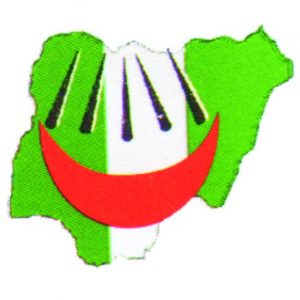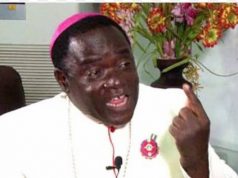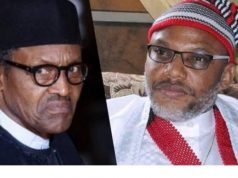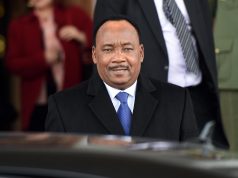 “Politics defines the Government, which in turn defines the Lives of the Citizens. Politics as an
“Politics defines the Government, which in turn defines the Lives of the Citizens. Politics as an
Ethical Activity should promote the creation of a’ Just Society”
Politics remain a human activity which involves interactions and interrelationships amongst free and equal citizens. It must aim at improving the conditions of man for the satisfaction of human needs or demands for higher standard of living in the society. This is quite significant to give meaning to life and to affirm the uniqueness of individuals. Thus, politics as an ethical activity should promote the creation of a’ just society’ which Aristotle earlier termed the ‘master science.’ In a world fraught with desires for self- esteem or self -actualization, needs, anxiety, fear, force and frustration human beings cannot survive or remain human without becoming political. As Ayoade (1997, p.2) points out, it is politics that defines the government, which in turn defines the lives of the citizens, who in the final analysis define the politics of the state. Essentially, politics is an attempt to reduce tensions between needs and social realities. To this end, language becomes significant to achieve such purpose. 
What seems to be very important in any political society is not just the campaign message but the structure that make the message or slogan a realizable thought. “There is nothing more powerful than an idea. Ideas created and now control the world we live in. When an idea is conceived, it is called a thought; When a thought is conceived it is called a concept, concepts are the material that dreams are made of and they serve as the substance for living and interpreting life. As a matter of fact, inventions are often called ones “brain child.” In essences, the mind can be impregnated by ideas that develop into concepts that become visions that produce reality.” DR MYLES MUNROE.
Every change that the world has experienced sprang fort from a man, be it social, political, spiritual, and scientific. A nation or group of People will either advance or retrogress in measure of her thought pattern and capacity to infuse life into her thought. You should know that thought are spatial in nature and makes no meaning in material form until they are made to have one in reference to specific points. All this are done in a confine, in my thought I call this building structure into intangible resources, giving it an opportunity to become expressive in the material world. This is what makes the deference between achievers and unproductive people.
For Nigeria just like the children of Israel moving from Egypt to the promise land it has been a long walk to that place called her dream land, a place where her dreams and aspirations can be fulfilled, a land of people with diverse history and culture that was handed a dream by the western world after the Berlin conference.
In 1885 at the Berlin Conference, the European powers attempted to resolve their conflicts of interest in Africa by allotting areas of exploitation. The conference also enunciated the principle, known as the “dual mandate,” that the interests of both Europe and Africa would best be served.” by maintaining free access to the African continent for trade and by providing Africa with the benefits of Europe’s civilizing mission”. This is what I call the big dream handed to Nigeria by the west.
Britain’s claims to a sphere of influence in the Niger Basin were acknowledged formally, but it was stipulated that only effective occupation would secure full international recognition. In the end, pressure from France and Germany hastened the establishment of effective British occupation and the creation of protectorates in northern and southern Nigeria.
Frederick Lugard, who assumed the position of high commissioner of the Protectorate of Northern Nigeria in 1900, was occupied with transforming the commercial sphere of influence inherited from the Royal Niger Company into a viable territorial unit under effective British political control. His objective was to conquer the entire region and to obtain recognition of the British protectorate by its indigenous rulers, especially the Fulani emirs of the Sokoto Caliphate. Lugard’s campaign systematically subdued local resistance, using armed force when diplomatic measures failed. Lugard’s success in northern Nigeria has been attributed to his policy of indirect rule, which called for governing the protectorate through the rulers who had been defeated. If the emirs accepted British authority, abandoned the slave trade, and cooperated with British officials in modernizing their administrations, the colonial power was willing to confirm them in office. Lugard’s immediate successor, Hugh Clifford (1919–25), introduced a diametrically opposed approach emphasizing Western values. In contrast to Lugard, Clifford restricted the power of the northern emirs by scaling back indirect rule, while in the south he saw the possibility of building an elite educated in European-style schools.
British colonialism created Nigeria, joining diverse peoples and regions in an artificial political entity with little sense of a common Nigerian nationality. Inconsistencies in British policy reinforced cleavages based on regional animosities by attempting simultaneously to preserve the indigenous cultures of each area and to introduce modern technology and Western political and culture.
Independence by an act of the British Parliament, Nigeria became an independent country within the Commonwealth on October 1, 1960. In 1963 Nigeria became a republic within the Commonwealth. The change in status called for no practical oint session of the parliament, replaced the crown as the symbol of national sovereignty and the British monarch as head of state. Nnamdi Azikiwe became the republic’s first president.
In the postwar period, all significant political power remained concentrated in the FMG. The influence of Yakubu (Jack) Gowon, who had come to power in a 1966 coup, depended on his position as chairman of the Supreme Military Council, which was created in March 1967. The regime ruled by decree. In October 1970, Gowon announced his intention of staying in power until 1976, the target year for completion of the military’s political program and return to an elected civilian government. But many Nigerians feared that the military planned to retain power indefinitely. In 1972 Gowon partially lifted the ban on political activity that had been in force since 1966 in order to permit a discussion of a new constitution that would pave the way for civilian rule. However, the debate that followed was ideologically charged, and Gowon abruptly terminated the discussion. The Gowon regime came under fire because of widespread and obvious corruption at every level of national life. Inefficiencies compounded the effects of corruption. Crime also posed a threat to national security and had a seriously negative impact on efforts to bring about economic development. The political atmosphere deteriorated to the point where Gowon was deposed in a bloodless military coup in July 1975. The armed forces chose as Gowon’s successor Brigadier (later General) Murtala Ramat Muhammad, a Muslim northerner. Muhammad was assassinated during an unsuccessful coup in February 1976, but in a short time his policies had won him broad popular support, and his decisiveness elevated him to the status of national hero. He had sought to restore public confidence in the federal government, reduce government expenditures on public works, and encourage the expansion of the private sector. He also set in motion the stalled machinery of devolution to civilian rule by a commitment to hand over power to a democratically elected government by October 1979.
Lieutenant General Olusegun Obasanjo, a Yoruba, succeeded Muhammad. Keeping the established chain of command in place, Obasanjo pledged to continue the program for the restoration of civilian government in 1979 and to carry forward the reform program to improve the quality of public service. In 1979, under Obasanjo’s leadership, Nigeria adopted a constitution based on the Constitution of the United States that provided for a separation of powers among the executive, legislative, he federal capital from Lagos to a more central and judicial aims of government. The country was now ready for local elections, to be followed by national elections that would return Nigeria to civilian rule. Obasanjo also initiated plans to move the federal capital from Lagos to a more central location in the interior at Abuja. Ultimately, Abuja became the country’s capital in December 1991.
The Second Republic, 1979–83: In 1979 five revamped parties competed in national elections, marking the beginning of the Second Republic. The presidential succession from Obasanjo to a civilian, President Alhaji Shehu Shagari, was the first peaceful transfer of power since independence. Nigeria’s Second Republic was born amid great expectations. Oil prices were high, and revenues were on the increase. It appeared that unlimited development was possible. Unfortunately, the euphoria was short-lived. A number of weaknesses beset the Second Republic. First, the coalition that dominated federal politics was not strong, and in effect the victorious National Party of Nigeria (NPN) led by Shagari governed as a minority. Second, there was a lack of cooperation between the NPN-dominated federal government and the 12 states controlled by opposition parties. Third, and perhaps most importantly, the oil boom ended in mid-1981, precisely when expectations of continuous growth and prosperity were at a height. The ensuing recession put severe strains on the Second Republic.
Return to Military Rule: On December 31, 1983, the military seized power once again, ry regime tried to achieve two goals. First, it primarily because there was virtually no confidence in the civilian regime. Allegations of fraud associated with Shagari’s re-election in 1983 served as a pretext for the takeover, although the military was in fact closely associated with the ousted government. Ominously, the economy was in chaos. The true cost of the failure to use earlier revenues and foreign reserves to good effect now became apparent. The leader of the coup d’état was Major General Muhammadu Buhari, a Hausa whose background and political loyalties tied him closely to the Muslim north and the deposed government. The military regime tried to achieve two goals. First, it attempted to secure public support by reducing the level of corruption; second, it demonstrated its commitment to austerity by trimming the federal budget. In a further effort to mobilize the country, Buhari
launched a “War Against Indiscipline” in the spring of 1984. This national campaign, which lasted 15 months, preached the work ethic, emphasized patriotism, decried corruption, and promoted environmental sanitation. However, the campaign achieved few of its aims.
The economic crisis, the campaign against corruption, and civilian criticism of the military undermined Buhari’s position, and in August 1985 a group of officers under Major General Ibrahim Babangida removed Buhari from power. The Babangida regime had a rocky start. A countercoup in December 1985 failed but made it clear that not everyone in the military sided with the Armed Forces Ruling Council, which succeeded the Supreme Military Council. The most serious opposition centered in the labor movement and on university campuses. There was also considerable controversy over Nigeria’s entry into the Organization of the Islamic Conference, an international body of Muslim states, in 1986. Buhari’s regime had initiated the application, which Babangida allowed to stand. The strong reaction among many Christians proved to be an embarrassment to the regime.
Babangida addressed the worsening recession through the structural adjustment program of 1986. However, despite US$4.2 billion of support from the World Bank and the rescheduling of foreign debt, the recession led to a series of currency devaluations, a decline in real income, and rising unemployment during the second half of the 1980s. Babangida remained in power until 1993, when he ushered in an Interim National Government under the leadership of Chief Ernest Shonekan. This step followed the military’s annulment of election results in June 1993.
In November 1993, General Sani Abacha seized control from the caretaker government and served as military dictator funds deposited in Swiss banks during the welcomes diversity and inclusive culture, a nation is great when it grooms dreamers, inventors, artists, builders and doers, exalt achievements, rebound from failure and encourage one another every step of the way, from the little league, to the majors, in every walk of life.
A nation is great when all are her citizens have to make a conscious effort to consider and believe in our principles, encouraged one another to live out a simple creed. Every progressive and productive country is only a reflection of a working and sustainable systems. From my study, systems across the world are similar in terms of component. The terms of being successful has always been based on the enforcer or practitioners of the system example you will have component like territory, constitution, citizen, the law, the privileges, code of ethics, the army, commonwealth, and a social culture.
When these components are wrongly managed in reference to a specific system, harnessing her potential becomes a distant dream or you can call it a shadow from reality. Let us ask ourselves this question from the leadership to the followers have we been true and fair to the system that operate in this nation call Nigeria? Have we been true to promoting good education, have we been true to the taxation system, have we been true to diplomatic corp, have we been true in management of the economic, above all have we been true to ourselves and to GOD. We have gone round this mounting for too long it is time we pick up the mirror of our good dreams and aspirations, and begging to mould our piece and disjoined part into that hope that calling from within our being, the future is now , let us use our today to call fort the tomorrow we desire.









